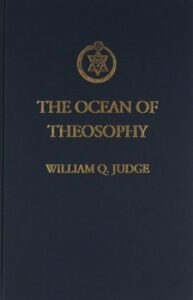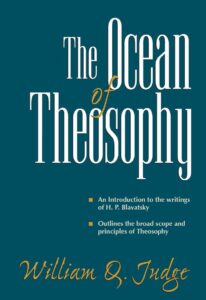Studies In The Ocean of Theosophy Part XXVIII
Theosophy Magazine
Vol. 23. No. 4 February 1935
pages 179 - 182
Part XXVIII
“THERE is no Karma unless there is a being to make it or feel its effects.” This familiar aphorism makes it obvious that there can be no Cycles unless there are beings to establish, maintain, terminate, and re-establish them. For the cycle represents the time aspect of Karma, as to measure, and its path, as to order of procedure; while Reincarnation is the process. “The beginning of a cycle must be a moment, that added to other moments makes a day, and those added together constitute months, years, decades and centuries,” thus erecting “the cycle into a comprehensive ring, which includes all in its limits.” At “the first moments of the solidification of this globe the mass of matter involved attained a certain and definite rate of vibration which will hold through all variations in any part of it until its hour for dissolution comes.” Now, the establisher of this permanent rate of vibration is Man himself; and when he leaves the globe, “with him goes out the force holding all together,” the consequence being “dissolution by fire or water or what not.”
A greater respect for humanity should arise with the conception of Man’s potential greatness and his exalted position in the vast Scheme of Evolution, the sweep and grandeur of which is obliterative of narrow and puerile aims. The possibilities of attainment are inspiring; the amplitude of time indicated for such attainment imbues one with hope and courage for the undertaking. Mighty is Man’s part in the great war for the conquest of Spirit over Matter, the term “Man” including all self-conscious beings, from divine Manasic hierarchies down to the least human unit. On the other hand, Science and Religion belittle mankind by positing for it an outside source — Religion regarding an impossible God, who ordains an orthodox muddling through of existence for all who would gain the doubtful boon of eternal rest in the bosom of the Father; while Science seems scarcely convinced that the human kingdom is more than an outgrowth of lower forms, mind emanating from matter, and matter spontaneously self-produced. But the Cosmogony of the Wisdom-Religion re-paints the picture, putting Man in his rightful place as evolutionary agent. And this picture requires continuous re-painting, in vivid colors, if the deadening influence of the present race-mind is to be shaken off.
Granting that self-conscious entities have set the solar and planetary cycles rolling and that they shall finally be the cause of their cessation, human supervision must also enter into the present processes of Nature. In fact, the Teaching indicates that without such co-operation, the lower kingdoms could not produce their least phenomena. The upward surge of life-force in mineral, plant, and animal is but response to stimulus from higher intelligences.
However, Man is not only creator and quickener, but, by opposite direction of his powers, becomes destroyer. All potencies, both wonderful and terrible, center in him, employable creatively, preservatively, or destructively. He “is a great dynamo, making, storing and throwing out energy, and when masses of men composing a race thus make and distribute energy, there is a resulting dynamic effect on the material of the globe which will be powerful enough to be distinct and cataclysmic.” Thus, the spectator of some titanic manifestation of the elements trembles in awe before his own production, unrecognized as such through lack of self-knowledge.
The Human Principles are drawn from and function upon corresponding planes of substance, composing the seven-fold planet. These substances while within a man’s sphere of influence become charged with his energy and qualities. Upon re-emanation, these are carried back to the various departments of Nature as electromagnetic force. Great numbers of people acting from the same general motive tremendously affect all the kingdoms. The uplifted purpose of a race governed by Manas, inspired by Buddhi, would in the progress of time glorify old Earth with shining vestures analogous to the sheaths of Venus. On the contrary, the selfish race, impelled by Kama and with mind enslaved to impulse, must suffer corresponding reactions from the spheres it ravishes. Earth, Water, Fire, and Air rush to do the bidding of Manas, whether it be united to Buddhi or bound to Kama. Nature is responsive to any demand, returning brimming measure of all bestowed upon her.
Separative and repellent, Kama-Manas is necessarily disintegrative; its energies charge the earth-globes with forces so disruptive as to bring on violent physical reactions. The concurrence of such explosions with extreme changes in the affairs of men evidences their subtle connection. So it is that violence tends to mark the intersection of cycles. No particular sort of action holds exclusive possession of the field of consciousness, but currents of constructive and of destructive action may sweep along their courses at the same time; while modifying each other all along the way, perhaps, there come periods of culmination, when the opposing forces definitely clash. Less turbulent periods represent intermediate stages; for it is plain that the series of events comprising a cycle must ascend progressively to their climax and as gradually recede. This process is apparent throughout the phenomenal world and is just as true of tides of thought and feeling as it is of the tides of the sea. When high tides of opposing character meet, that is, when cycles intersect, violence follows the elemental kingdoms reflecting outwardly the violence long active in the consciousness of the race.
Yet, the inherent Ideal of Human Perfection demands the ultimate triumph of righteousness. As under the ocean’s surface turmoil lie the quiet deeps, so do calm and beneficence reside beneath the conflict of human passions. But Nature hurries nothing, while conserving everything, and even of the very destructive forces generated makes use, to tear down the unworthy and clear the way for the worthy. Thus destruction sometimes seems to hold sway, but later comes the clash of good and evil, followed by gradual gain of constructiveness, with final triumph. It is at transition points that “men record cataclysms” previously inscribed on the secret tablets of the heart.
Truly, Man is his own greatest mystery — the motive power for all cycles, recipient of the joys and sorrows that these Wheels of Karma roll back to him, yet attributing his experiences to external causes! Of course, social and political changes are recognized as man-made; but how about considering these as possible causes for the changes on land and sea or in the air? Upon this point, Theosophy leaves no ambiguity. The statement is unequivocal that the “vast and awful disturbances in the strata of the world,” due to earthquakes and ice formation, geologically speaking, have their real causation in human thought and emotion.
Nevertheless, destruction is necessary to progress, albeit much destruction is unnecessary. The good of an old order could not expand to greater good unless the old order were destroyed as such. It would appear, however, that regenerative destruction need not be cataclysmic in a calamitous sense. The withdrawal of Man’s spiritual will, the planet’s cohesive force, produces dissolution; the withdrawal of his attention brings obscuration upon a planetary globe. Then, why might not desertion of some area due for a rest bring about the necessary destruction without suffering to anyone? Inasmuch as individuals uninvolved in a calamity find themselves absent from the place of doom at the crucial moment, uninvolvement on the part of nations, races or even all mankind would indicate, on the one hand, at once, Karmic stamina and on the other, provide means for natural disintegration, benign destruction. Then even the vastest alterations, such as “shifting of the poles of the globe” would be as harmless as the crumbling of a flower-pod after its seed has fallen.
Much might be learned from our common communication — so often couched in terms of the elements and processes of Nature. Who fails in the understanding of such expressions as “fire in the eye,” “heat of anger,” “whirling minds,” “cold looks,” “attraction and repulsion,” “high feelings,” “low spirits”? And the resultant effects of these upon the physical, or earth, body should point the source of fires, floods, tornadoes and hurricanes, ice flows, and earthquakes, with their destruction of lives!
Let Science scoff and Religion refer to Jehovah’s “judgments”; but brethren of the church, solemnly quoting what “Paul says,” could profitably ponder his statement regarding the groaning and travailing together of all Nature, on account of the iniquities of man — in full agreement with the Secret Doctrine. Yet, might all Nature smile on account of the benevolence of man, who, intimately connected “with every secret part of Nature,” receives back in kind whatsoever he deposits in the universal treasury. If the repayments come in strange and foreign coin, it is because the original deposits were made in lands now foreign, in other embodiments, at times long forgotten. Herein lies the clue to the sufferings of the seemingly guiltless, like innocent children swept before the fury of some awful cataclysm, while others no more innocent are shielded from harm. The real experiencer is not the child-body, but the reincarnating Person, possessor of ancient affinities good or ill.
Understanding of the three-pronged doctrine of Karma, Reincarnation and Cycles would do away with the stress and strife ever harassing human kind. In it lies corroboration of that old Biblical saying, highly valuable to society if grasped, but meaningless without the light of Theosophy: “Vengeance is mine; I will repay, saith the Lord” (Law). None need take the law into his own hands, fearful lest some other escape punishment deemed due him. Retaliation has no rightful place in life. But were men to constitute themselves compensatory agents only, even their mistakes along these lines would be turned to constructive ends, and the whole planet would respond with blessings now undreamed.
Back to The Ocean of Theosophy



